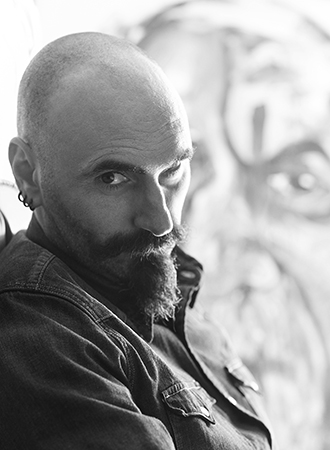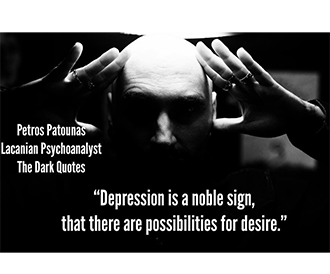The epistle to the Antioch, and to those Doubles of the Same, too much of the Same, who have reduced the Real into a palaveric discourse of philosophy in speaking about the world from a stasis, a Fixierung of other appurtenances and an organ and not an Organon of diagnosis, truly of their position, for they know not how to speak, and they know not about knots, but they very well know about the doing, not the Act- the woman in not Not All, but all knots and Theseus alone knew how to use Ariadne’s thread∙ and beyond doubt they can argue about an arrangement for psychoanalysts, and, worst to be, of their interventions and Voice, as if life was in a languishing semiosis, another funda-mental fantasy belonging to the analysts who have never actually died: they speak for a stasis and not for Anastasis because their configuration of what is prognosticated has not led them to death and, hence, they desire with the flesh, thinking that desire can actually be housed with blood, bones, and skin- they yet to learn that, as far as the plasticity of the destiny is concerned, the Phallus is replaced by the Breath and can never be its counter-wish in a dream, for, the Πνοή του Λόγου, of that Lunguage where the psychoanalysts’ interpretations do not form new signifiers but construct the Nothing for the destiny’s Letters: where the Phallus was, the Real, which is the Ethic, shall be: and with that, Pygmalion has created the feminine, not the Agalma of Pygmalionism’s object- yet again another veil of the feminine.
But the commander of the Antiochian cherubic legion, guardians of the origination that has already rediscovered psychoanalysis in its own authentic time, has long now congested harboring faith to the Real, which is the Ethic of a tickle of a palm, of a Plasma’s trigonometric topography, with some aid from the hypotenuse’s axiomatic phoneme, upon the graph of Desire in the comportment seduction of the perpendicular axing, and to the facts that psychoanalysts ought to give evidence for – that what is actually repressed is desire – and has bequeathed like a beggar to the imaginary of sermonizing and not even praying about the Voice of Life, without, without at first living it∙ from the cosmos to the Unheimlich: he who is not the charlatan of the Other doe not jaw his letters and recites a new speech, saying that the feminine loves the Voice- for, there is no other way for her to leave the Avatar of her signifiers, but, for that to happen the masculine subject must at first, and beyond shadow of the object’s doubt, accept to admeasure the flection of a trigonometrically attuned crisis with the phallus, and, with the Ethic at hand, evaporated like that mist on the wall that keeps reshaping its mystery, the Letter, interpolated by Lacan when, at the same seminar, he never failed to return to the la lettre d’amour, to love and to work- thus from its signifiers of morality: it is not deontology, I mean, the Act, for it is not incarcerated into the circuit of a binary but of structural anabasis where the symptom, not the subject, like the Logos of a river never to be the same, flexes a feminine stream: in and within the Act, which the simpleton nominates as 2, two acts because he has never hold in his hands a thread: the act of the psychoanalyst creates a space for responsibility and the assumption of the price to be paid, in regards to the structures and not to jouissance alone∙ I mean accountability for desire, and the knowing what to do with it.
I am Alpha and Omega and the Ουσία that can only be a Breath of the feminine- too much of a feminine for a man to witness: my ears auscultate the nasty noises of a few chairs of those masters, cracking their furniture’s wood- they cannot move in breathing spaces along the breeze of such an inhalation, for, they have to discover how does this particular subject, this analysand in question, has access to Lunguage: and that is the work of a figure of speech, in attendance from the very first session, never preliminary because the analyst as a geography of the Ουσία does not unearth his kinesis in the stasis of the phantasy: the destiny of the Letters is the orientation after the Sinthome, beyond that threshold where, at its gates, psychoanalysts usually stop: it forms the No-Body and the Being Silent, the ErgOn, in the same comportment that one crosses the verge from language to Lunguage towards the breathing of his letters: it is at this, where, excluding the dearth of the Other forming the options of a so called sexual relationship, where the mathematics of the sexes remind us of the beyond the Name of the Father and the knowing what to do with the structure of the woman, not her Double but the contexualisation of her breath, the set including two desires privated, avowed in a perverse compass reading, and directed to scrupulous causes- it is then that the sexual act causes desire, via the Voice and not the Gaze, because the Voice is the way to the Breath, in the equivalent thoroughfare, that, before the Act, not the psychotherapeutic Act that shifts the sitting arrangements in the matching fantasy and sophisticates identifications, before the Act as I was saying, there, we have the prolegomena, which is a set of signifiers precisely not talking about the Act· this particular Act crosses perpendicularly the graph of desire, crossing and setting the bar on the elliptical yet in linear motion path of the signifiers, themselves tied to the jouissance and the Fixierung, the Alphabet Stasis where the subject can read but cannot write.

